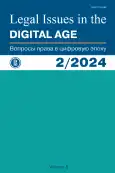Regulating Digital Era: A Comparative Analysis of Policy Perspectives on Media Entertainment
- Authors: Sony R.1, Chopra S.1
-
Affiliations:
- Centre for the Study of Law and Governance, Jawaharlal Nehru University
- Issue: Vol 5, No 2 (2024)
- Pages: 97-112
- Section: IT, INDUSTRIES, LAW: MEDIA
- URL: https://bakhtiniada.ru/2713-2749/article/view/294030
- DOI: https://doi.org/10.17323/2713-2749.2024.2.97.112
- ID: 294030
Cite item
Full Text
Abstract
The rapid proliferation of digital media platforms has democratized content creation and distribution, enabling a vast spectrum of voices to be heard. It has brought about a significant shift in media entertainment landscapes worldwide, with India being a prominent case study due to its vast and diverse content consumption patterns. The massive content on the Internet has also raised concerns regarding misinformation, copyright infringement, and cultural sensitivity. Therefore, in the context of media entertainment, the regulation of the digital era presents a vast complex array of challenges for policymakers. Thereby, it analyzes the regulatory challenges and policy perspectives; addressing how India is navigating the complexities introduced by digital technologies. The study outlines India’s current regulatory framework including legislative measures. Apart from this, the paper contains exploration of challenges of balancing free speech with societal norms in a country characterized by its cultural pluralism. The authors of the article argue that rational regulation is able to help to prevent the spread of misinformation, protect national security, and ensure privacy. It can play a pivotal role in promoting national integration by fostering unity, preventing communal tensions, and ensuring equal representation. To achieve the objectives, the paper analyzes three case studies — Swami Ramdev v. Facebook, Inc.* (2019), the Tandav Controversy (2021), and the Tiktok ban for privacy and security concerns (2020). In the later section, the authors analyze and compare the regulatory framework of different states including India, the United States, European countries, Australia, and China. In the end, the paper summarizes the need for changes in the regulatory framework and also recommends policy measures that may be implemented to safeguard the consumers’ interest, preserve cultural values, and ensure the integrity of content.
About the authors
R. Sony
Centre for the Study of Law and Governance, Jawaharlal Nehru University
Author for correspondence.
Email: reetasonyjnu@gmail.com
S. Chopra
Centre for the Study of Law and Governance, Jawaharlal Nehru University
Email: shruti.jmi@gmail.com
References
- Anand N., Brass I. (2021) Responsible innovation for digital identity systems. Data & Policy, 3, e35. doi: 10.1017/dap.2021.35
- Bagdikian B.H. (2004) The New Media Monopoly. Boston: Beacon Press, 299 p.
- Baker C.E. (2009) Media, Markets, and Democracy. Cambridge: University Press, 216 p.
- Belli L., Zingales N. (2019) Platform values: Conflicting rights, artificial intelligence and tax avoidance by digital platforms. Internet Governance Forum. Available at: https://www.intgovforum.org/system/files/filedepot/57/special_issue_platform_values_igf_consolidated_.pdf (accessed: 20.04.2022)
- Bruns A. (2007) Produsage: Towards a broader framework for user-led content creation. In: Creativity & Cognition: Proceedings of the 6th ACM SIGCHI Conference on Creativity & Cognition, pp. 99–106.
- Curran J. (2011) The Media and Democracy. New York–Oxford: Routledge, 255 p.
- Doyle G. (2002) Media Ownership: The Economics and Politics of Convergence and Concentration in the UK and European Media. London: SAGE Publications, 192 p.
- Flanagan A.J., Metzger M.J. (2008) Digital Media, Youth, and Credibility. Cambridge (Mass.): MIT Press, 202 p.
- Flew T., Martin F.R. (eds.) (2022) Digital Platform Regulation. London: Palgrave, 263 p.
- Garton Ash T. (2016) Free Speech: Ten Principles for a Connected World. New Haven (Conn.)–London: Yale University Press, 491 p.
- Gillespie T. (2018) Custodians of the Internet: Platforms, Content Moderation, and the Hidden Decisions that Shape Social Media. New Haven (Conn.)–London: Yale University Press, 297 p.
- Lotz A.D. (2021) Media Disrupted: Surviving Pirates, Cannibals, and Streaming Wars. Cambridge (Mass.): MIT Press, 200 p.
- McChesney R.W. (2008) Free Press: The Political Economy of Media. New York: Monthly Review Press Publishers, 589 p.
- McChesney R.W. (2015) Rich Media, Poor Democracy: Communication Politics in Dubious Times. New York: New Press, 496 p.
- Mendiratta R., Barata J. (2019) Ramdev v. Facebook, Inc.* Available at: https://wilmap.stanford.edu/entries/ramdev-v-facebook-inc-2019 (accessed: 16.10.2022)
- Metzger M.J., Flanagan A.J. (2008) Digital Media and Youth: Unparalleled Opportunity and Unprecedented Responsibility. Journal of Communications, vol. 58, no. 3, pp. 333–341.
- Napoli P.M. (2001) Foundations of Communications Policy: Principles and Process in the Regulation of Electronic Media. New York–Springfield: Hampton Press, 344 p.
- Narayanan R. (2024) Legal compliance for OTT platforms in India: Understanding the regulatory landscape. Available at: https://www.khuranaandkhurana.com/2024/04/03/legal-compliance-for-ott-platforms-in-india-understanding-the-regulatory-landscape/ (accessed: 19.06.2024)
- Noam E.M. (2016) Who Owns the World’s Media? Media Concentration and Ownership around the World. Oxford: University Press, 440 p.
- Noble S.U. (2018) Algorithms of Oppression: How Search Engines Reinforce Racism. New York: New York University Press, 248 p.
- Pickard V. (2019) Democracy without Journalism? Confronting the Misinformation Society. Oxford: University Press, 264 p.
- Priya V.B.A. (2023) Overview of over-the-top (OTT) platforms in India: analysis of IT Rules 2021, judicial battles, balancing act of artistic freedom of speech and expression, and challenges for regulation in India. Available at: https://legalresearchandanalysis.com/overview-of-over-the-top-ott-platforms-inindia-analysis-of-it-rules-2021-judicial-battles-the-balancing-act-of-artisticfreedom-of-speech-and-expression-and-challenges-for-regulation-in-india/ (accessed: 21.04.2024)
- Suzor N. (2019) Lawless: The Secret Rules that Govern our Digital Lives. Cambridge: University Press, 218 p.
- Tworek H., Leersseen P. (2019) An Analysis of Germany’s NetzDG Law. Available at: https://www.annenbergpublicpolicycenter.org/ (accessed: 24.05.2023)
- Vogel H.L. (2020) Entertainment Industry Economics: A Guide for Financial Analysis. Cambridge: University Press, 680 p.
- Voigt P., von dem Bussche A. (2017) The EU General Data Protection Regulation: a practical guide. Berlin: Springer International Publishing, 122 p.
- Zuboff S. (2019) The Age of Surveillance Capitalism: The Fight for a Human Future at the New Frontier of Power. New York: Public Affairs Publishing, 704 p.
Supplementary files










